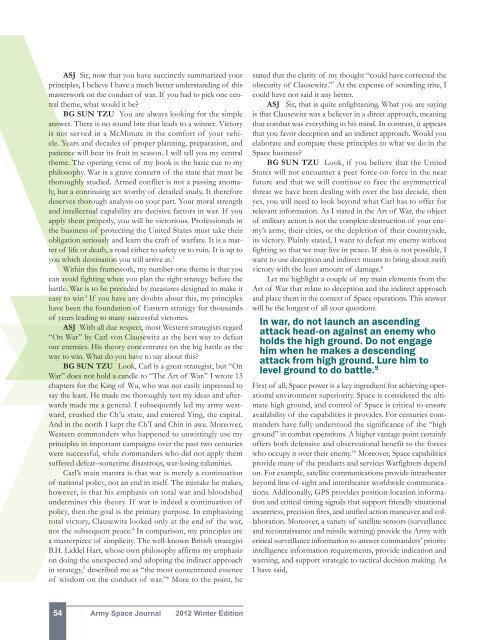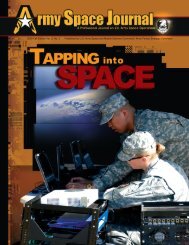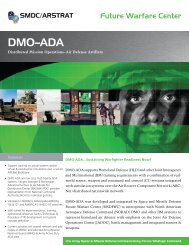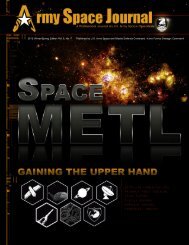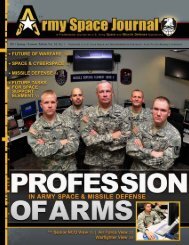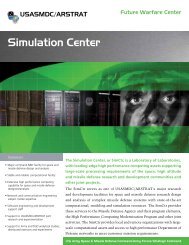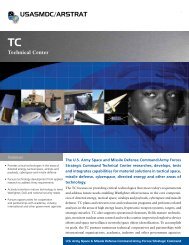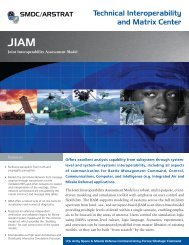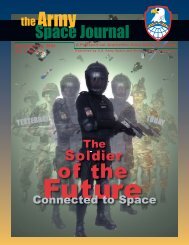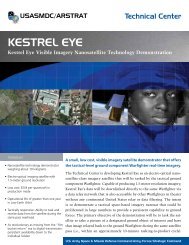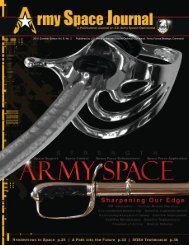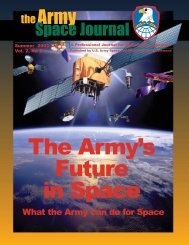2012 Winter - Space and Missile Defense Command - U.S. Army
2012 Winter - Space and Missile Defense Command - U.S. Army
2012 Winter - Space and Missile Defense Command - U.S. Army
Create successful ePaper yourself
Turn your PDF publications into a flip-book with our unique Google optimized e-Paper software.
ASJ Sir, now that you have succinctly summarized your<br />
principles, I believe I have a much better underst<strong>and</strong>ing of this<br />
masterwork on the conduct of war. If you had to pick one central<br />
theme, what would it be?<br />
BG SUN TZU You are always looking for the simple<br />
answer. There is no sound bite that leads to a winner. Victory<br />
is not served in a McMinute in the comfort of your vehicle.<br />
Years <strong>and</strong> decades of proper planning, preparation, <strong>and</strong><br />
patience will bear its fruit in season. I will tell you my central<br />
theme. The opening verse of my book is the basic cue to my<br />
philosophy. War is a grave concern of the state that must be<br />
thoroughly studied. Armed conflict is not a passing anomaly,<br />
but a continuing act worthy of detailed study. It therefore<br />
deserves thorough analysis on your part. Your moral strength<br />
<strong>and</strong> intellectual capability are decisive factors in war. If you<br />
apply them properly, you will be victorious. Professionals in<br />
the business of protecting the United States must take their<br />
obligation seriously <strong>and</strong> learn the craft of warfare. It is a matter<br />
of life or death, a road either to safety or to ruin. It is up to<br />
you which destination you will arrive at. 2<br />
Within this framework, my number-one theme is that you<br />
can avoid fighting when you plan the right strategy before the<br />
battle. War is to be preceded by measures designed to make it<br />
easy to win .3 If you have any doubts about this, my principles<br />
have been the foundation of Eastern strategy for thous<strong>and</strong>s<br />
of years leading to many successful victories.<br />
ASJ With all due respect, most Western strategists regard<br />
“On War” by Carl von Clausewitz as the best way to defeat<br />
our enemies. His theory concentrates on the big battle as the<br />
way to win. What do you have to say about this?<br />
BG SUN TZU Look, Carl is a great strategist, but “On<br />
War” does not hold a c<strong>and</strong>le to “The Art of War.” I wrote 13<br />
chapters for the King of Wu, who was not easily impressed to<br />
say the least. He made me thoroughly test my ideas <strong>and</strong> afterwards<br />
made me a general. I subsequently led my army westward,<br />
crushed the Ch’u state, <strong>and</strong> entered Ying, the capital.<br />
And in the north I kept the Ch’I <strong>and</strong> Chin in awe. Moreover,<br />
Western comm<strong>and</strong>ers who happened to unwittingly use my<br />
principles in important campaigns over the past two centuries<br />
were successful, while comm<strong>and</strong>ers who did not apply them<br />
suffered defeat–sometime disastrous, war-losing calamities.<br />
Carl’s main mantra is that war is merely a continuation<br />
of national policy, not an end in itself. The mistake he makes,<br />
however, is that his emphasis on total war <strong>and</strong> bloodshed<br />
undermines this theory. If war is indeed a continuation of<br />
policy, then the goal is the primary purpose. In emphasizing<br />
total victory, Clausewitz looked only at the end of the war,<br />
not the subsequent peace. 4 In comparison, my principles are<br />
a masterpiece of simplicity. The well-known British strategist<br />
B.H. Liddel Hart, whose own philosophy affirms my emphasis<br />
on doing the unexpected <strong>and</strong> adopting the indirect approach<br />
in strategy, 5 described me as “the most concentrated essence<br />
of wisdom on the conduct of war.” 6 More to the point, he<br />
stated that the clarity of my thought “could have corrected the<br />
obscurity of Clausewitz.” 7 At the expense of sounding trite, I<br />
could have not said it any better.<br />
ASJ Sir, that is quite enlightening. What you are saying<br />
is that Clausewitz was a believer in a direct approach, meaning<br />
that combat was everything in his mind. In contrast, it appears<br />
that you favor deception <strong>and</strong> an indirect approach. Would you<br />
elaborate <strong>and</strong> compare these principles to what we do in the<br />
<strong>Space</strong> business?<br />
BG SUN TZU Look, if you believe that the United<br />
States will not encounter a peer force-on-force in the near<br />
future <strong>and</strong> that we will continue to face the asymmetrical<br />
threat we have been dealing with over the last decade, then<br />
yes, you will need to look beyond what Carl has to offer for<br />
relevant information. As I stated in the Art of War, the object<br />
of military action is not the complete destruction of your enemy’s<br />
army, their cities, or the depletion of their countryside,<br />
its victory. Plainly stated, I want to defeat my enemy without<br />
fighting so that we may live in peace. If this is not possible, I<br />
want to use deception <strong>and</strong> indirect means to bring about swift<br />
victory with the least amount of damage. 8<br />
Let me highlight a couple of my main elements from the<br />
Art of War that relate to deception <strong>and</strong> the indirect approach<br />
<strong>and</strong> place them in the context of <strong>Space</strong> operations. This answer<br />
will be the longest of all your questions.<br />
In war, do not launch an ascending<br />
attack head-on against an enemy who<br />
holds the high ground. Do not engage<br />
him when he makes a descending<br />
attack from high ground. Lure him to<br />
level ground to do battle. 9<br />
First of all, <strong>Space</strong> power is a key ingredient for achieving operational<br />
environment superiority. <strong>Space</strong> is considered the ultimate<br />
high ground, <strong>and</strong> control of <strong>Space</strong> is critical to ensure<br />
availability of the capabilities it provides. For centuries comm<strong>and</strong>ers<br />
have fully understood the significance of the “high<br />
ground” in combat operations. A higher vantage point certainly<br />
offers both defensive <strong>and</strong> observational benefit to the forces<br />
who occupy it over their enemy. 10 Moreover, <strong>Space</strong> capabilities<br />
provide many of the products <strong>and</strong> services Warfighters depend<br />
on. For example, satellite communications provide intratheater<br />
beyond line-of-sight <strong>and</strong> intertheater worldwide communications.<br />
Additionally, GPS provides position-location information<br />
<strong>and</strong> critical timing signals that support friendly situational<br />
awareness, precision fires, <strong>and</strong> unified action maneuver <strong>and</strong> collaboration.<br />
Moreover, a variety of satellite sensors (surveillance<br />
<strong>and</strong> reconnaissance <strong>and</strong> missile warning) provide the <strong>Army</strong> with<br />
critical surveillance information to answer comm<strong>and</strong>ers’ priority<br />
intelligence information requirements, provide indication <strong>and</strong><br />
warning, <strong>and</strong> support strategic to tactical decision making. As<br />
I have said,<br />
54 <strong>Army</strong> <strong>Space</strong> Journal <strong>2012</strong> <strong>Winter</strong> edition


